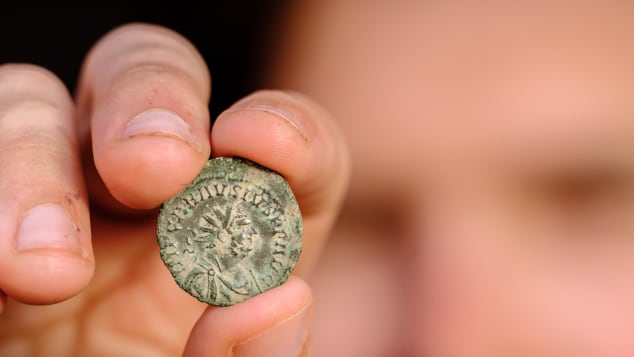Colosseum in Rome opens underground galleries for the first time 0:55
(CNN) -
The excavation of a historic amphitheater, in which thousands of people gathered to witness gladiator fights, wild animal hunts and executions, has revealed important facts about how the Romans who inhabited the coast of southeast England lived. .
English Heritage archaeologists working in Richborough, Kent, discovered a cell within the amphitheater, known as a carcer, which likely would have housed gladiators, criminals, and wild animals before they were released into the arena to learn of their gruesome fate.
The amphitheater was discovered during a Victorian excavation in 1849, but details about its possible uses have now come to light, and English Heritage archaeologists said in a press release that it would have "provided city dwellers with a place to public shows and entertainment ".
2,700-year-old "luxury" toilet discovered in Jerusalem
Paul Pattison, senior property historian at English Heritage, said in the press release: "The discoveries we have made during the excavation at Richborough are surprising and exciting, and radically transform our understanding of the structure of the amphitheater and the nature of the adjacent settlement. in the city".
Archaeologists excavating the Roman amphitheater at Richborough, Kent.
Credits: Jim Holden / English Heritage
The excavation also suggests that the Romans living at Richborough may have cared for the domestic animals, as evidenced by the "poignant" discovery of the nearly complete skeleton of a Roman cat, which had been purposely buried in an area of domestic settlement outside the amphitheater.
The cat was named Maxipus by English Heritage, a charity dedicated to the conservation of monuments, buildings and historic sites in England.
advertising
Archaeologists working at the site have also uncovered coins, dismembered animal bones, pottery shards, and personal adornment that demonstrate that the Roman settlement of Richborough was occupied by civilians until the late 4th century, the entire Roman period in Britain. .
Pattison told CNN that Richborough would have been one of the most unique and diverse Roman settlements in Britain.
Archaeologists discovered coins, pottery shards, and even the skeleton of a cat.
Credits: Jim Holden / English Heritage
"As Richborough is a coastal area, it would have served as a connection between what was then called Britannia and the rest of the Roman Empire, and therefore all kinds of Romans from all corners of the Empire would have passed and lived in the settlement", Pattison said.
The excavation has provided some puzzles to be solved, such as two heavily burned rectangular areas, described as "bright red-orange in color," believed to be the remains of Roman buildings that stood against the outer turf wall of the amphitheater.
Two fans of diving discovered a treasure of Roman coins of enormous value
Although it is not clear what function these buildings would have served, English Heritage said that "their destruction by fire must have been dramatic, although the reason is unknown."
A major redevelopment of the Richborough site museum will take place later this year, which will reopen to the public in the summer of 2022.
Gladiators

